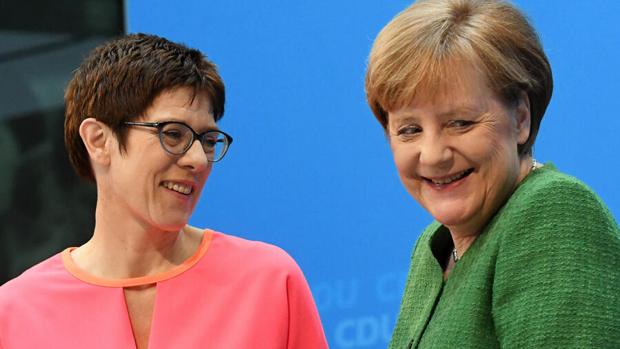
Last weekend's elections in Thuringia, in which the
Anti-European and Anti-ForeignerS Alternative for Germany (AfD) party won almost
one in four votes and stood as the second political force ahead of the
Conservatives, have created chaos in the address at Merkel's CDU. As expected,
all those not benefiting from the succession to the front of the party in
favour of Annegret Kramp Krrenbauer (AKK) rushed into the jugular as soon as
the ballot boxes closed.
"We
cannot continue to ignore this", Friedrich Merz slid on social media,
blaming both of the difficulty of the electorate in distinguishing the CDU from
the Social Democrats and suggesting the need for another candidate for the next
generals. In addition to Merz, the names of Jens Spahn, the current
Minister of Health, have been heard; Armin Laschet, regional president of North
Rhine-Westphalia; and even Markus Soder, president of Bavaria and not belonging
to the CDU, but to the CSU.
But the candidates to overthrow AKK also do not agree
with each other, but are fratricidal old enemies. Laschet prevented Spahn's
rise as the Ministry of Defense and Merz and Spahn distrust each other after
Merz nearly lost the election of the party leader in late 2018 because only 60%
of Spahn's voters , which he had agreed to give him in the second round, to
reach his destination. While half-party ruled out any kind of collaboration
between the CDU and AfD to make Thuringia governable, the other means advocate
slammed into the agreement, a dispute recorded live on television shows. And
Merkel, in the middle of this grill, is silent and travels on an official visit
to India.
"Is Merkel still Chancellor of Germany?" der
Spiegel asked this week. If Henry Kissinger once complained that he didn't know
who to call when he wanted to talk to Europe, right now the question is who to
call to talk to Germany.
But the CDU is not the only party paralyzed in Germany. The
SPD Social Democrats, who only got 8.3% of the vote in Thuringia, are engaged
in a laborious process of primaries in which the militants have already been
consulted in a first vote. Not even the man who now holds the reins of the
party and the structure, Finance Minister Olaf Scholz, managed to prevail in
that first round, in which 53% of its 425,000 militants participated, so the
SPD walks with haci parsimony to a second vote, spending months and months of
legislature as the vote continues to increase from extremes, both Die Linke
(the left), winner in Thuringia, and the far right of AfD.
"If
those parties are getting more votes, it's certainly because they have clearer
leadership and direction", conservative MP Carsten Linnemann said. The
candidates of Die Linke and AfD in Thuringia represent a strong leadership not
currently seen in the Volkspartei and the electorate is voting for people,
rather than parties.
Midway through the legislature, the lack of leader
prevents the SPD from invoking the grand coalition's revision clause, which
would lead to early elections, while Merkel, which had that clause and has been
dismissed early, already seems absent in the face of the recession that
technically it is already starting in the German economy.
Last September, he already surprised that Merkel and AKK
each flew to the United States to attend the same climate summit there. In a
government obsessed with saving polluting emissions, two aircraft with the same
fate meant little less than heresy. They argued agenda issues and the rest of
German politics split between those who gave up rumours of rupture and those
who explained that AKK must set a standoff to get its own political profile.
This argument is now heard again between sources of the
Chancellery in the silence of Merkel, who has not come out to defend his
favorite even though he seems to almost lose his candidacy.
"There are two priorities That Angela Merkel has set
for her exit: leave her, let no one throw her out, and that her departure does
not cause a loss of power for her party", she explains. 'The chancellor
sees these attacks on AKK as a logical test of stress and will not intervene
because polls keep saying that the CDU wins and any meddling on her part could
be reprehensible'.
SOURCE: ABC
